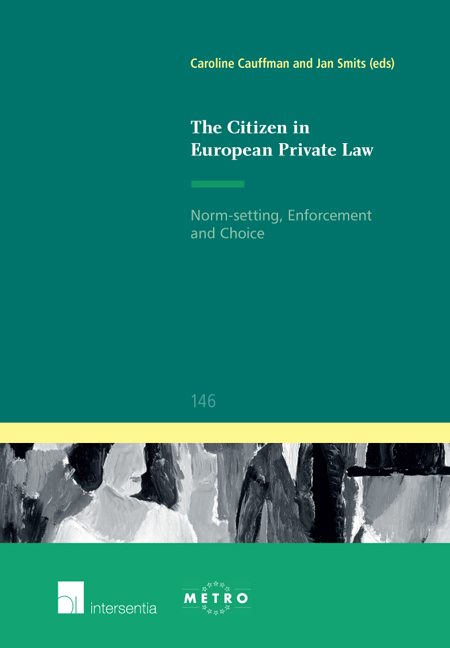Introduction
Published online by Cambridge University Press: 21 September 2018
Summary
Introduction
Private law traditionally allows citizens a large role in shaping their legal relationships. Although this private autonomy always needs to be balanced against other instrumental goals that the law aims to achieve, it seems that during the last decades the importance of autonomy has increased. Private actors (not only citizens, but also companies) increasingly set their own rules (by way of codes of conduct and other types of private regulation, but also by allowing religious and cultural minorities to set their own norms), revert to private enforcement of these rules (such as Alternative Dispute Resolution and Online Dispute Resolution), and choose their applicable law (according to some authors leading to a true ‘law market’). This tendency is visible in a wide range of subfields, including contract law, company law, consumer law and family law. Unfortunately, however, this phenomenon of increasing autonomy in choosing, setting and enforcing norms was until now seldom studied from a horizontal perspective. What is missing so far is how increasing autonomy (and its limits) is perceived in the various sub-fields of private law, and in what these perceptions differ. It is true that in company law there is much attention for private codes, while in consumer law dispute resolution is a hot topic and in family law religious norms are scrutinised. But there is very little attention for looking at these phenomena together and to try to draw conclusions from this that go beyond one specific field. This is a clear lack in the study of this important phenomenon.
The aim of this book is to fill this gap. Of course, this is not a full horizontal survey of how autonomy works out in all subfields of private law. This volume must rather be seen as a collection of essays highlighting various aspects of party autonomy. The contributing authors, coming from various fields of private law, where invited to reflect on three central questions: (1) is the increased reliance on private actors supported by empirical evidence?; (2) what are the perceived benefits of this increased reliance, if any?; and (3) what should be the limits of party autonomy in your field? The original papers were presented at the conference of 18 October 2013 and subsequently adapted to fit this book.
- Type
- Chapter
- Information
- The Citizen in European Private LawNorm-Setting, Enforcement and Choice, pp. 1 - 6Publisher: IntersentiaPrint publication year: 2016



